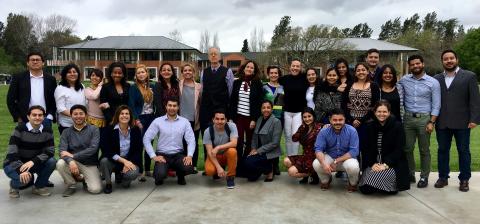Q&A with Professor Stan Kowalski

UNH Franklin Pierce has announced the fall 2022 return of the International Technology Transfer Institute Clinic (ITTI). Led by Professor Stan Kowalski, JD ’05, who has more than two decades of research and international development experience, the clinic works with students to promote science, technology, and innovation in developing countries by engaging in projects that involve everything from establishing relationships with IP professionals and officials in those countries to helping them create strategies for furthering the infrastructure of innovation. Professor Kowalski shared his thoughts about the ITTI Clinic in a recent interview.
Why was it important to bring back the ITTI Clinic?
The world is in turmoil. This should be obvious to anyone who follows the news. A combination of global challenges is converging in this century — armed conflict, failed states, climate change, pandemics, and mass migrations. Among the principal drivers of these challenges is a chronic failure of developing countries to diversify their economies from commodities, tourism, and low-end manufacturing to science, technology, and innovation; they are essentially stuck in a post-colonial quagmire. Sri Lanka is now a case study, having become a fragile state teetering on failed state status; a catastrophic and precipitous economic implosion has occurred, with political and social reverberations intensifying daily.
What will the fall Sri Lanka project look like?
A team of six students will work together to research the situation in Sri Lanka, consult with our external partners (e.g., National Innovation Agency “NIA” of Sri Lanka and the WIPO East Asia and Pacific Bureau), and then formulate a strategic action plan for pragmatic capacity building, which advances innovation in Sri Lanka. A key feature of this plan will be intellectual property law, practice and management, and best practices in technology transfer as applicable to Sri Lanka’s current stage of development.
You mentioned that the project goal is to foster accelerated strategic capacity building. What does that mean? What will success look like?
As recently stated in the Economist magazine, “Sri Lanka and the IMF have been negotiating a bailout and a plan to restructure the country’s debt.” Whereas this is a temporary fix, it is neither a long-term nor final solution. In the 21st century, developing countries are facing a brutal reality: they cannot refinance their way out of 19th-century, post-colonial economies. Furthermore, too many years have passed (i.e., been wasted), during which there should have been serious investment in strategic capacity building in science, technology, and innovation. Therefore, action plans must now be formulated which address this harsh reality and accelerate development. The name of our project sums this up: “Strategic Action Plan for Innovation-Driven Development in Sri Lanka: A Blueprint for the Future.”

The clinic is about establishing international relationships to help promote innovation. How will this new project accomplish that?
It is critical to understand that the emerging global economy of this century is all about innovation. Increasingly, intangible intellectual assets make up the bulk of value in international trade and transactions, exceeding that of tangible goods, services, and commodities. It is but a short leap to understand that this requires highly sophisticated skill in communicating across cultures, whether it pertains to negotiations, licensing, R&D collaborations, or technology transfer. In order to recover (and survive in this century), Sri Lanka urgently needs to build the human capital and institutional infrastructure to connect to this globalized innovation marketplace. By so doing, it will be increasingly able to identify, access, absorb, adapt, and assemble technological components which then become critical innovations in health, agriculture, energy and production; this generates prosperity, wellbeing, and hope for a brighter future.
Why is it important to introduce law students to the global legal community?
As mentioned, the 21st century’s greatest economic driver will be innovation. The rapidly emerging global economy is just that — global, diverse, and increasingly internationalized. This presents challenges, of course, but also incredible opportunities. Our students will not only be educated and articulate, but also practice-ready to hit the tarmac running, taking off into awesome careers, which simultaneously provide personal advancement and also serve the greater global public interest, building innovation for a better world — literally projecting the positive energy of the Powerhouse across the planet.
The return of the ITTI clinic is in no small measure due to the dynamic leadership, enthusiasm, energy, and vision of Dean Megan Carpenter. She, along with Micky Minhas, the Executive Director, Franklin Pierce Center for Intellectual Property, have worked in tandem to reinvigorate international outreach. Their recent sojourn to Latin America exemplifies their mutual commitment to re-positioning UNH FP Law as a global leader in IP education. By building partnerships and forging the global interface, they are creating exciting opportunities. Indeed, such application of theory to practice, of rumination to action, is in the time-honored tradition of the Franklin Pierce Law Center, now re-envisioned as the Powerhouse, pointing the world to a better tomorrow.